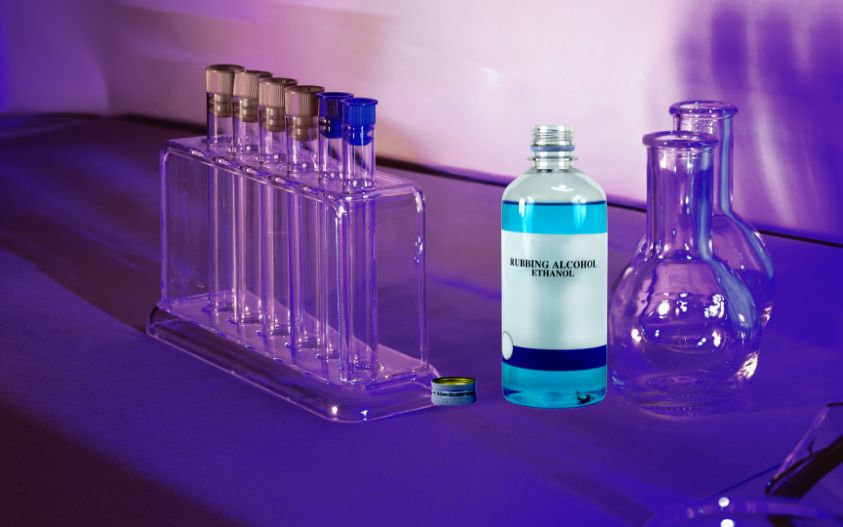Rubbing alcohol is a common household object, especially since the COVID-19 pandemic when the awareness of the importance of sanitizers became widespread. It is also used extensively in hospitals and nursing homes, where the risk of infection is high.
However, rubbing alcohol can be a risk for people with alcohol addiction.
What is rubbing alcohol and how careful do people recovering from alcohol addiction need to be? Here’s what you need to know.

What is Rubbing Alcohol?
Rubbing alcohol, also known as isopropyl alcohol, is a chemical substance used primarily for cleaning and disinfecting purposes. It is a household item commonly found in bathrooms, first-aid kits, and medicine cabinets. It acts as a disinfectant as well as a topical antiseptic to prevent infections in minor cuts and scrapes. Unlike the ethanol found in alcoholic beverages, rubbing alcohol is not meant for consumption since its effects on the human body can be severe even in small amounts.
Chemical Composition
Isopropyl alcohol is a volatile and flammable liquid. It is not only dangerous if consumed, but also if it is inhaled or absorbed in significant volumes. Whereas ethanol is processed by the liver to metabolize into less harmful substances, isopropyl alcohol breaks down into acetone, a highly toxic compound, making it extremely hazardous.
Why People with Alcohol Addiction Turn to Rubbing Alcohol?
When struggling with severe alcohol addiction, a person faces immense cravings. They might seek out any available source of alcohol no matter how dangerous and unappealing. Some individuals go so far as to resort to consuming rubbing alcohol if it is their only accessible option.
Another factor leading people to misuse rubbing alcohol is the misconception that all forms of alcohol are similar. Those unfamiliar with the chemical differences between ethanol and isopropyl alcohol may mistakenly believe that rubbing alcohol will provide the same effects as drinking beer, wine, or liquor. As such, the lack of public knowledge about the toxic nature of isopropyl alcohol leads many to underestimate its life-threatening consequences.
Health Risks of Consuming Rubbing Alcohol
Isopropyl alcohol is extremely toxic and ingesting it can lead to rapid absorption into the bloodstream where it can cause damage to multiple organs. Even a small amount of rubbing alcohol can be harmful, and in larger doses, it can be deadly. When metabolized by the liver, it breaks down into acetone, a substance that is poisonous and can overwhelm the body’s detoxification system.
Short-Term Effects
Short-term effects may include nausea, vomiting, dizziness, disorientation, abdominal pain, and headaches. The body reacts violently to the ingestion of isopropyl alcohol, trying to expel the substance as quickly as possible. In more severe cases, individuals may experience respiratory difficulties, seizures, and a dangerously slowed heart rate. The effects of rubbing alcohol ingestion often set in quickly, making it a fast-acting and life-threatening danger.
Long-Term and Fatal Consequences
Continued or excessive use of rubbing alcohol can lead to long-lasting damage:
- Damage to Internal Organs: Isopropyl alcohol can cause permanent damage to the liver and kidneys, as these organs struggle to process the toxins. This damage can result in liver or kidney failure, which may be irreversible without medical intervention.
- Nervous System Impact: Long-term consumption of rubbing alcohol can result in neurological complications, such as brain damage and memory loss. The toxic effects on the nervous system can impair cognitive functions, potentially leading to permanent disability.
- Potential for Coma or Death: In severe cases, ingesting rubbing alcohol can cause coma or death due to alcohol poisoning. The toxic substances build up quickly in the bloodstream, leading to critical failure of vital organs, including the heart and lungs.
These health risks make rubbing alcohol an especially dangerous substance when misused by those with alcohol addiction.
Psychological and Social Consequences
In addition to the physical dangers, ingesting rubbing alcohol can have significant psychological effects. People struggling with alcohol addiction often already face mental health challenges such as depression, anxiety, or trauma. The consumption of isopropyl alcohol can exacerbate these issues, leading to increased feelings of hopelessness and despair. The toxic effects on the brain can trigger confusion, paranoia, or even hallucinations, further damaging a person’s mental well-being. Repeated misuse can lead to chronic cognitive impairments, making recovery from both addiction and mental health conditions much more difficult.
The misuse of rubbing alcohol also takes a severe toll on relationships. Loved ones of individuals struggling with addiction often feel helpless, angry, or betrayed, especially when more extreme behaviors – like consuming rubbing alcohol – occur. The desperation and dangerous actions associated with such misuse can erode trust between family members and friends. Additionally, the secrecy and shame surrounding addiction can isolate individuals further, making it difficult for them to seek help or for loved ones to intervene effectively.
Avoiding Misuse of Rubbing Alcohol
Rubbing alcohol is a common household product, which is why it can pose such a problem for people with alcohol addiction. Here are some steps to take to avoid its misuse:
- Remove Rubbing Alcohol from the Household: If removing the product is not possible, store it in a locked cabinet or an area that is not easily accessible.
- Use Safer Alternatives: Consider switching to safer, non-alcohol-based alternatives. Many effective disinfectants and cleaning products use hydrogen peroxide, vinegar solutions, or bleach-based cleaners instead.
- Monitor Other Alcohol-Containing Products: It’s important to recognize that many common household items contain alcohol, such as mouthwash and personal hygiene products. Carefully read labels to identify alcohol-based products and ensure they are either safely stored or replaced with non-alcoholic options.
Conclusion
Rubbing alcohol can present a danger for people with alcohol addiction even when they are sober. Since there are non-alcoholic alternatives to products with rubbing alcohol, consider replacing all alcoholic products in your home, no matter whether they are made for drinking or other purposes.




